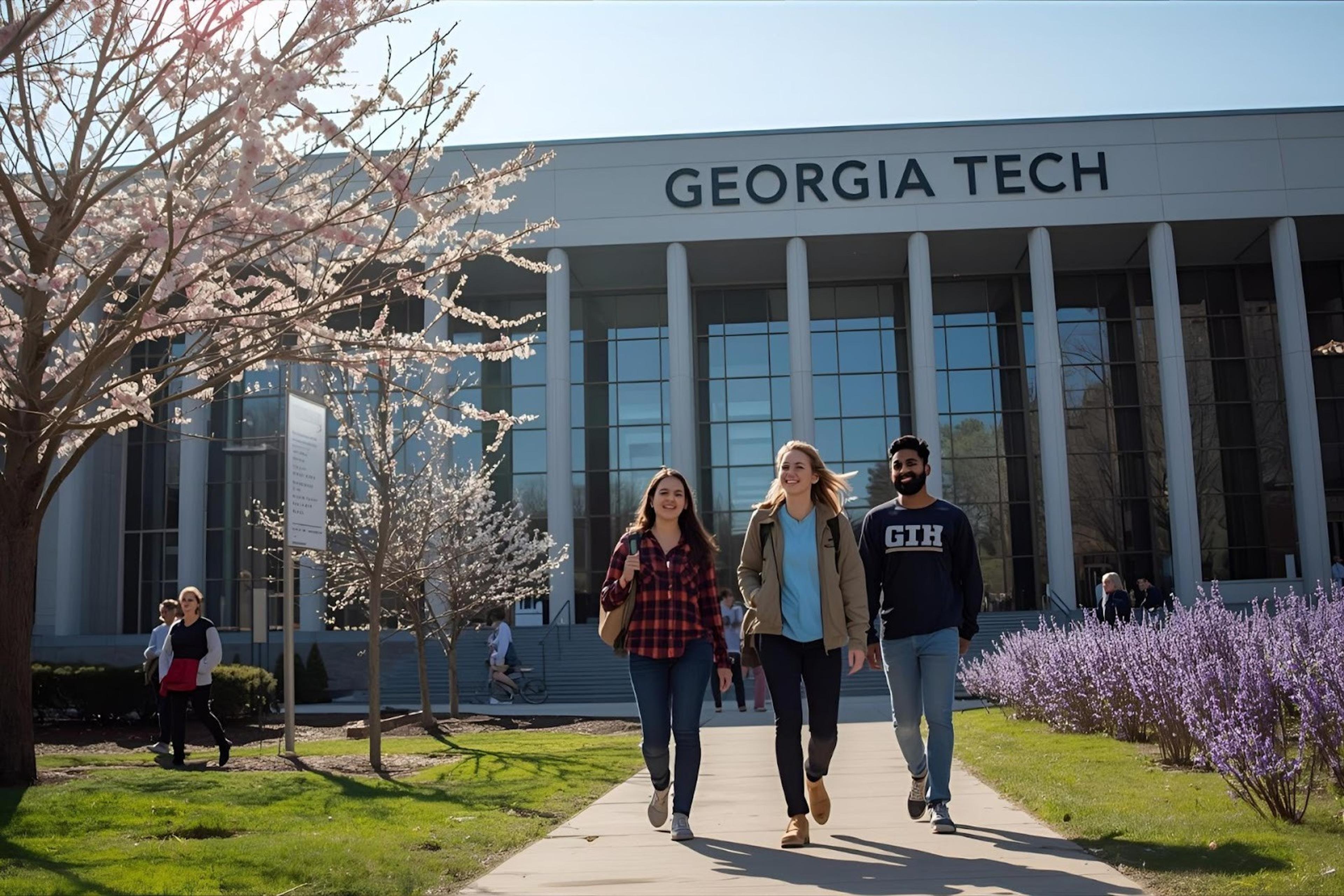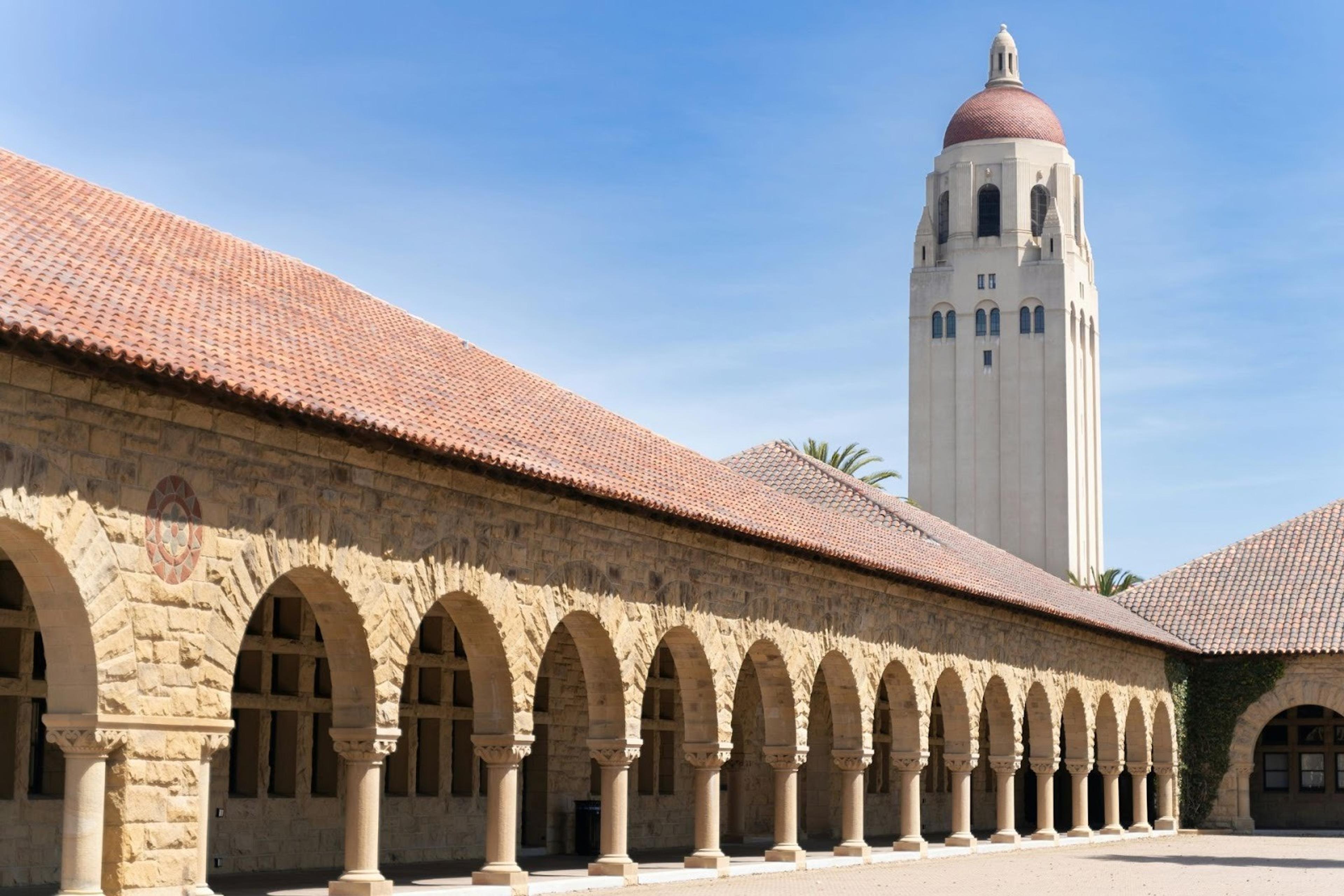Georgia Tech Online Master's in Comp Sci (OMSCS) — What to Know & How to Get In (2025)
Is Georgia Tech OMSCS right for you? Learn what the program really demands, how to get in, and how to succeed while working full-time.
Posted November 6, 2025

Join a free event
Learn from top coaches and industry experts in live, interactive sessions you can join for free.
Table of Contents
If you’re considering the Georgia Tech OMSCS, the online master of science in computer science from Georgia Tech, you’re likely juggling a full‑time job, wondering if you can learn at your own pace, and asking: “Is this program worth my time, money, and effort?”
This guide will walk you through the program, the true schedule and effort required, how to succeed as a working professional, and whether it really leads to career impact.
What is the OMSCS program?
The OMSCS is Georgia Tech’s online master’s degree in computer science, formally, an online Master of Science (MS) in Computer Science. It offers the same rigor and curriculum as Georgia Tech’s on‑campus MSCS but delivered fully online.
Key facts:
- The degree requires 30 credit hours (approximately 10 courses) to complete.
- You pick one specialization (e.g., computing systems, interactive intelligence) and then add electives.
- It is a “true” master’s degree in computer science, not just a certificate. It’s designed to be flexible so working professionals can study while maintaining a full‑time job.
Why Working Professionals Choose The Georgia Tech OMSCS
Working professionals are drawn to Georgia Tech’s OMSCS because it uniquely balances prestige, flexibility, and career ROI. The program is designed for individuals with full-time jobs, offering the flexibility to study at your own pace and accommodate coursework around demanding schedules. You’re not just earning a master’s degree in computer science but also doing it without pausing your income or stepping away from your career.
‘The cost is refreshingly low for a top-ranked university, and the Georgia Tech brand carries serious weight in the tech industry. For many, it’s a launchpad: countless students have used the OMSCS to pivot into roles in software engineering, data science, or network security.
One student on Reddit put it plainly: “I totally transferred careers thanks to my OMSCS experience.”
Whether you're aiming for advancement or a full pivot, this program lets you learn while you earn without compromising on rigor or reputation.
Real-World Insights from OMSCS Students: What You Should Really Expect
If you’re considering Georgia Tech’s OMSCS while working full-time, hearing directly from current students and alumni is one of the most valuable ways to set expectations. Here’s what they say: the good, the hard, and how to plan.
What students like about OMSCS
Even with a demanding schedule, many students genuinely enjoy parts of the program. Courses like Introduction to Information Security are often called out as both engaging and rewarding. One Reddit user shared:
“The projects were super interesting, little hacking puzzle boxes… I got my first A in OMSCS with this one.”
Others enroll simply out of curiosity and still come away with surprising outcomes:
“I did the program for fun, not for money or a career change, but it worked out well in those ways anyway. No ragrets!”
The takeaway? You don’t have to sacrifice enjoyment or intellectual curiosity, even while balancing a full-time job. In fact, many students find that the best courses feel like a “deep dive” hobby that pays off professionally.
What makes it challenging, and how students manage
1. The workload is real.
Expect to spend 10–20 hours per week per course, depending on the subject and your background. Courses like Machine Learning and Graduate Algorithms are especially time-intensive. One student noted:
“GA and ML are both hard… to earn an A, it took me between 15–20 hours a week.”
Another stated:
“The weekly time commitment varies… I peg it between 10–15 hours per week.”
For working professionals, that translates to at least two focused hours per day, or longer weekend study blocks. Time management is critical — and starting assignments early is a must.
2. Your background matters.
Georgia Tech states that preferred applicants have an undergraduate degree in computer science or a related field, with a 3.0+ GPA. Students without this background often need to ramp up on foundational topics like algorithms, data structures, or systems before or during the program. The good news: OMSCS doesn’t require a CS degree — but if you’re coming from a non-CS background, plan to invest extra effort in self-learning and prep.
3. It demands discipline and strong motivation.
This isn’t a passive online experience; it’s academically rigorous and requires sustained focus. One student put it bluntly:
“OMSCS is no joke. You will be challenged.”
Another reflected on the bigger picture:
“From an academic perspective, the program is legit. But it takes serious time and effort — especially when you also have a job and life responsibilities.”
Students who succeed tend to treat OMSCS like a second job or part-time contract: scheduling time, managing deliverables, and proactively seeking help from classmates or course staff.
Takeaway: The program is flexible, but it isn’t easy. The students who thrive are those who take it seriously, build routines, and stay ahead. If you’re clear on your goals and prepared to carve out consistent time, OMSCS can be a highly rewarding (and yes, even fun) experience — even with a full-time job.
Admissions: What You Need and How to Stand Out
Getting into Georgia Tech’s Online Master of Science in Computer Science (OMSCS) isn’t impossible, but it’s not automatic either. The program has grown significantly in reputation, size, and competitiveness since it launched, so your application needs to be clear, credible, and compelling, especially if you’re coming from a non-traditional background.
Core Admissions Requirements
According to the official OMSCS admissions page, you’ll need:
- A bachelor’s degree (or equivalent international credential)
- Preferably an undergraduate degree in computer science or a closely related field (e.g., math, computer engineering, electrical engineering)
- A cumulative GPA of 3.0 or higher
- Official transcripts from all institutions attended
- A resume, statement of purpose, and three letters of recommendation
Notably: There is no GRE requirement, and Georgia Tech evaluates candidates holistically, especially those with strong professional or project experience.
Read: Statement of Purpose vs. Personal Statement: Differences, Tips, & What to Know
What If You Don’t Have a CS Background?
If your undergraduate degree isn’t in computer science, or you don’t have formal CS coursework, you can still get in, but you need to prove your readiness. The admissions committee looks for signs that you’ve mastered the fundamentals and can succeed in a rigorous academic environment.
Here’s how to strengthen your case:
1. Show proof of self-learning
If you’re pivoting from another field, showcase:
- Completed MOOCs (e.g., Harvard’s CS50, MIT OpenCourseWare, Udacity)
- Verified certificates in data structures, algorithms, or Python/Java/C++
- GitHub repositories of personal or collaborative projects
- Relevant side work or technical contributions in your current job
Georgia Tech even recommends these prep topics explicitly: programming (preferably object-oriented), data structures, algorithms, and computer systems.
2. Position your work experience as an asset
If you’re working full-time in a technical (or adjacent) role, even outside pure software, highlight how you’ve already applied CS concepts. That could mean automating processes, analyzing data, writing scripts, or managing engineering teams. Show how this master’s will formalize and deepen what you’ve started.
3. Write a targeted, specific Statement of Purpose
This is not a generic personal essay. It should clearly explain:
- Why you want a master’s degree in computer science
- Why OMSCS is the right program for your goals and life stage
- How you plan to manage the workload alongside your full-time job
- What you’ll contribute to the OMSCS community (and eventually, the field)
A good statement connects the dots between your background, motivation, career direction, and readiness.
Read: 10 Grad School Statement of Purpose Examples That Worked
4. Choose the right recommenders
Aim for letters from people who can speak to both your technical potential and your ability to handle a demanding graduate program while working. That could be a current or former manager, a professor from a recent course, or a mentor in your industry.
Read: How to Get Started on Your Letters of Recommendation for Graduate School
If you want expert eyes on your OMSCS application, work with our coach who has helped applicants get into Georgia Tech and other top master’s programs.
Jacob K. – OMSCS graduate and Stanford GSB student with a Navy leadership background; expert in crafting standout applications for technical master’s programs.
What the OMSCS Program Will Actually Demand
Getting into Georgia Tech’s OMSCS is just the beginning; the real test is whether you can stay consistent once the courses begin. Especially as a working professional, it’s essential to know what the day-to-day and semester-to-semester demands will look like so you can plan accordingly and avoid burnout.
Time Commitment and Pacing
Most current students agree: to succeed in a single OMSCS course while working a full-time job, expect to dedicate 10 to 20 hours per week. That means carving out serious time, whether it's two hours every weeknight or focused weekend sessions. And that’s per course. The good news is that the program is built with flexibility in mind. You’re not locked into a rigid schedule; you can take one course per semester or accelerate if your bandwidth allows.
That flexibility, however, comes with trade-offs. Taking only one course per term will stretch the program to three to five years, depending on how consistently you enroll. With 30 credit hours required (roughly 10 courses), many students complete the degree in about 8 to 10 semesters. If you’re juggling family, a demanding job, or other responsibilities, this slower pace is both common and totally acceptable, but it's important to set clear expectations for yourself up front.
The Structure of the Coursework
Don’t let “online” fool you; the OMSCS coursework is just as rigorous as Georgia Tech’s on-campus program. Each course typically includes recorded lectures, weekly or bi-weekly assignments, larger projects, exams, and active online discussion forums. Some classes are heavy on theory; others, especially in areas like network security, operating systems, or computing systems, rely on complex, hands-on projects that demand not just time but deep concentration.
Students often describe certain courses as “weed-out” classes, not officially, but based on the intensity and depth required. One Redditor noted that courses like graduate-level operating systems mirrored the toughest parts of their undergrad CS experience. If you haven’t previously studied data structures, algorithms, or systems design, expect a steep learning curve and allocate extra time during your first few semesters to ramp up.
Time management is not optional. Successful students treat their coursework like a second job, complete with weekly planning, strict work sessions, and clear deadlines. One student shared that they started every assignment the moment it opened and broke each project into bite-sized milestones to avoid last-minute stress. That approach is especially important when juggling OMSCS with a full-time role.
Cost and Return on Investment
One of the most appealing aspects of OMSCS and a key reason it attracts working professionals is the cost. The entire degree costs a fraction of what traditional, on-campus master’s programs charge, even at public universities. For a world-class computer science education from a top-ranked institution, the ROI is hard to beat.
But cost-effectiveness doesn’t mean low quality. In fact, many students report that they’ve learned more and been challenged more in OMSCS than in their undergrad degrees. The value comes not just from the Georgia Tech brand, but from the depth of material, the quality of instruction, and the professional doors it opens.
Read: A Great Admissions Coach Can Be Life-Changing – Here’s How
How To Choose Your Specialization: Example In Network Security
Suppose you’re interested in network security or a related field. Here’s how to approach it in the OMSCS program.
- Network security is one of the many subject areas you could pursue via electives and a specialization or minor.
- Look at the specialization tracks offered (e.g., computing systems, interactive intelligence) and pick one aligned with your career goal (e.g., cybersecurity).
- Align your current job or side projects with this: if you’re already in IT/infosec, build your own lab, run security projects, log your experiences, and use them in your application and coursework.
- Use the program to deepen your understanding of computer science fundamentals, not just the applied side, but deeper theory. This helps you stand out.
Sample OMSCS Course Roadmap: Network Security Focus
Foundational Courses (start here)
These will build your computer science fundamentals, essential if your undergrad wasn’t in CS or if you’re returning after time away.
- CS 6200: Introduction to Operating Systems - Critical for understanding system-level security, memory management, and process isolation.
- CS 6035: Introduction to Information Security - A core course that covers confidentiality, integrity, authentication, and real-world security attacks.
- CS 6515: Graduate Algorithms - Required for most specializations; foundational for all technical work, including cryptography and threat modeling.
Core Security & Systems Courses
These align directly with a career in network security or security engineering.
- CS 6262: Network Security - Covers threats to network protocols, firewalls, intrusion detection, and secure communication.
- CS 8803: Advanced Operating Systems - Deep dive into kernel-level operations, virtualization, and security implications at the OS level.
- CS 6037: Introduction to Cryptography - Essential for understanding how data is securely transmitted and stored. Strong mathematical foundation required.
Supportive Electives (choose based on goals)
These complement your security focus with applied skills and broader systems thinking.
- CS 6250: Computer Networks - Strong foundational course for understanding protocols, TCP/IP stack, and routing (critical for security roles).
- CS 6400: Database Systems Concepts and Design - Useful if you’re aiming for application security or want to understand how to secure sensitive data.
- CS 6310: Software Architecture and Design- Great for students interested in secure software development or system-wide threat modeling.
- CS 8803: Cyber-Physical Systems Security (when offered) - Focuses on IoT, embedded systems, and security of physical devices.
Capstone / Final Stretch
Once you've built core knowledge and a few projects under your belt, finish strong.
Use your final semesters to revisit earlier concepts through applied projects. Consider writing a technical blog, GitHub portfolio, or giving a talk (even on YouTube or LinkedIn) to showcase your skills (a bonus for job hunting).
How to Maximize Your ROI and Succeed in OMSCS
The Georgia Tech OMSCS program is flexible, affordable, and high-impact — but only if you approach it with intention. Based on insights from current students, alumni, and real-world experience, here’s how to get the most out of the program as a working professional.
Build Your Schedule Early
Before enrolling, map out how many courses you can realistically handle per semester based on your full-time job, family, and other life responsibilities. One course per semester, with 10–15 hours of work each week, puts you on a four- to five-year timeline. If you’re able to take two courses in some terms, you can potentially finish in closer to two or three years.
The key is building a repeatable schedule. That might mean setting aside two hours after dinner each night, or dedicating focused time on Saturday mornings. Treat it like a recurring meeting you can’t cancel. Early consistency matters more than sprinting through the first semester.
Strengthen Your Computer Science Fundamentals Up Front
If your undergraduate degree wasn’t in computer science, it’s essential to brush up on the core concepts before or during your first term. That means revisiting object-oriented programming, algorithms (like graphs, recursion, and dynamic programming), and data structures. These aren’t just “nice to know”; they’re foundational to many OMSCS courses, and the stronger your grasp going in, the less overwhelming your first year will feel.
Students who do this prep in advance report lower stress, faster ramp-up, and better results from day one. Even if you’re coming from a technical job, brushing up on theory is worth your time.
Choose Your First Semester Strategically
The first semester often sets the tone for your entire experience. Instead of diving into the most difficult or prestigious-sounding course, choose something that’s both interesting and manageable. Many students recommend starting with a class that overlaps with your current work or past experience, or simply one you’ll enjoy. That “early win” can build momentum and confidence, which is invaluable as you adjust to the program’s rhythm.
A strong first semester also gives you space to refine your study schedule, test your time management, and build habits that will carry you through the more demanding courses ahead.
Actively Manage Your Assignments and Projects
OMSCS isn’t structured like an undergrad classroom. You’re expected to manage long-term projects, independent study, and fast-moving assignments, often with little handholding. Start every assignment as soon as it’s released. Break it into manageable tasks, set weekly goals, and track your progress.
Use the tools and community at your disposal: course forums, office hours, Slack groups, and even study groups. Just because it’s online doesn’t mean you’re on your own. And remember, life will get in the way. Work deadlines, family needs, burnout. Build buffer time into every week so you’re not scrambling under pressure.
Leverage Your Job and Side Projects
One of OMSCS’s biggest advantages is that you don’t have to leave your job to earn a world-class degree, but that also means you have a built-in lab. Apply what you’re learning directly to your job: script a new tool, analyze your company’s architecture, audit a security practice, or redesign a database schema. That kind of applied learning is both valuable to your employer and deeply reinforcing to your understanding.
Outside of work, invest in side projects that align with your specialization. Document them, publish them, or share them on GitHub or LinkedIn. These become assets not just for learning, but for career growth and interviews down the line.
Graduation and What Comes Next
Once you complete the 30 credit hours with a minimum 3.0 GPA, you’ll officially earn your Master of Science in Computer Science from Georgia Tech. But the value of the degree often extends far beyond the diploma.
Many alumni report significant career pivots, increased compensation, or access to more technical and leadership roles. The key is reflecting on what you want next. Do you want to move into a new field? Specialize further? Lead a team? The time to plan for that shift is during your final semesters, when you can still tailor your course choices, projects, and portfolio toward that next step.
Is It Worth It For You? Decision‑matrix
Here’s a quick decision table to help you evaluate whether Georgia Tech’s OMSCS is a strong match for your situation:
| Factor | Checkpoint | If you check it → good sign | If you don’t → extra caution |
|---|---|---|---|
| You’re a working professional with a full‑time job | Yes | This program’s flexibility works for you | If no full‑time job, consider pace & motivation |
| You’re comfortable allocating 10‑20 hours/week for coursework | Yes | Good start | If not, you’ll need a slower pace or fewer courses |
| You have either a CS undergrad or a strong self‑learning/fundamental programming & algorithms background | Yes | You’re aligned with preferred admissions criteria. | If no, plan for extra catch‑up |
| You’ve chosen a specialization or career direction (e.g., network security, computing systems) | Yes | The program can serve your goal | If not, spend time clarifying your “why” |
| You have the budget and are comfortable with the cost (and time) | Yes | ROI likely favorable | If cost/time is too high, consider a slower pace or alternate routes |
Final Prep Checklist: Your 90-Day Plan Before OMSCS
Use this checklist to get organized, build momentum, and set yourself up for success, from application to your first semester.
Clarify Your Career Goal
▢ Define why you’re pursuing this degree. Be specific.
Example: “In two years, I want to move into a network security role.”
Or: “I want to deepen my CS foundation to become a stronger software architect.”
Audit Your Fundamentals
▢ Evaluate your comfort with key CS topics: programming, data structures, algorithms, and computer systems.
▢ Enroll in at least one MOOC or certificate program this quarter if you need a refresher.
Create a Realistic Study Schedule
▢ Decide how many courses you’ll take per semester (start with one if working full-time).
▢ Block dedicated time each week (e.g., 2 hours per weekday or 6–8 hours on weekends).
▢ Treat it like a part-time job, same discipline, same boundaries.
Prepare Your Application Materials
▢ Draft a focused statement of purpose that answers:
- Why OMSCS?
- Why now?
- How will you balance it with work/life?
▢ Request letters of recommendation from people who can vouch for your technical skills and professional maturity.
▢ Update your résumé to reflect any relevant projects, coursework, or self-study.
Set Your Budget and Timeline
▢ Understand the total program cost and how you’ll fund it (out-of-pocket, employer support, etc.). ▢ Map your timeline:
- Finish in 2–3 years (2 courses in some semesters)
- Finish in 4–5 years (1 course per semester)
▢ Align your study plan with work, family, or personal goals to avoid burnout mid-program.
Once You’re Admitted
▢ Choose your first course carefully, ideally one that interests you and won’t overwhelm your schedule. ▢ Join the community (Reddit, Slack, Discord) to build support and stay motivated. ▢ Start assignments early, break projects into weekly goals, and stick to your study blocks. ▢ Use your current job or side projects to reinforce what you’re learning, and build as you go.
Final Thoughts: Is OMSCS Right for You?
Georgia Tech’s OMSCS program is one of the most rigorous, flexible, and affordable paths to a graduate-level computer science degree, but it’s not for everyone. It demands real-time, consistent effort, and a proactive mindset, especially if you're balancing it with a full-time job and other responsibilities. That said, for the right student, it can be career-defining.
If you're motivated, organized, and clear on why you're pursuing this path, whether it’s to pivot into software engineering, specialize in network security, or deepen your technical foundations, OMSCS gives you the structure, community, and credibility to do it on your terms.
And you don’t have to figure it out alone.
Want Personalized Guidance On Applying Or Succeeding Once You’re In?
Work with a Leland coach who’s completed OMSCS or helped others successfully navigate it. Whether you’re refining your statement of purpose, choosing your first course, or planning your study strategy as a working professional, the right coach can give you a roadmap — and help you avoid common pitfalls.
Browse top master’s programs coaches on Leland and find someone who’s been in your shoes. Your future in computer science starts with one smart step. Also, join our free events for more insights!
See: The 10 Best Graduate & PhD Admissions Consultants: What They Do and When to Hire One
Read next:
- Stanford MSCS: Program Overview, Acceptance Rate, & How to Get In
- How to Write a Personal Statement for Grad School (According to the Experts)
- How to Write a Killer Letter of Intent for Graduate School
- Beyond the Checklist: How to Showcase Your Unique Skills and Experiences in Your Grad School Applications
- What Extracurriculars are Graduate Programs Looking For?
- Why ChatGPT Can’t Write Your Personal Statement
- A Word of Caution on Application Essays and AI
- What GPA Do You Need to Get Into Graduate School?
- What Does "Holistic Review" Mean in Graduate School Admissions?
- Graduate Admissions: Myths Busted!
FAQs
Below are some FAQs pulled from actual threads and the official site.
Can I do the OMSCS while working full‑time?
- Yes. Many current students work full‑time. For example, one said: “I peg it between 10‑15 hours/week … I work 40 hours a week as well.” You may sometimes need more hours (15‑20) for tougher courses.
Do I need an undergraduate degree in computer science?
- Preferred yes. The program states: “Preferred qualifications … an undergraduate degree in computer science or related field…” If you don’t, you’ll be evaluated case‑by‑case; you’ll need to prove you have CS fundamentals via self‑learning, etc.
How long does OMSCS take to finish?
- Officially, with 30 credits (10 courses) required. If you take two courses per semester, you could finish in ~2‑3 years; if one course per semester, ~4‑5 years. One student shared “10 semesters (~3 years 4 months)” when working full‑time.
What’s the workload like for students with non‑CS backgrounds?
- It’s higher. One post: “15‑20 hours a week … still a burn” for a student without a CS undergrad. Another: “No, OMSCS isn’t too challenging. The median class only takes about 12.5 hours per week.” So your mileage will vary depending on your background.
Does OMSCS really help my career?
- Many say yes. One: “I totally transferred careers thanks to my OMSCS experience.”Another “I did the program for fun… but it worked out well in those ways anyway.” But as with any program, it helps if you engage actively, apply what you learn, and build your profile.
Browse hundreds of expert coaches
Leland coaches have helped thousands of people achieve their goals. A dedicated mentor can make all the difference.




















